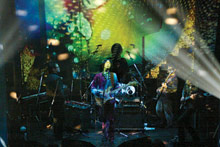When Masaki Batoh gave his psychedelic music collective the name “Ghost,” he couldn’t have come up with a more appropriate moniker if he’d taken the 25 years of the group’s existance to consider the matter. Few bands manage to walk in so many worlds and carry along so many musical sensibilities. The traditional and the experimental don’t so much collide as occupy the same space, exploring the balance and tension between the elegant and the primal. “We just play the music we want to listen to,” Batoh tells Xpress, with help of the Babel Fish translation program. “There is no alchemy.”

Batoh grew up in Kyoto, Japan, loving Western rock music from a young age (Bob Dylan, Pink Floyd, The Velvet Underground) and also inspired by a contemporary crop of experimental and psychedelic Japanese bands. These days, Batoh admits that he finds most contemporary music not particularly inspiring, “But [the music of] Jeni Melia moves me.” (Melia is an accomplished soprano who is often accompanied by lute. She’s a member of The English Ayre, a small group of musicians dedicated to preserving early music.)
In 1984 Batoh formed Ghost. “We were bored with ‘70s and early ‘80s music,” he says. Early performances were the product of a large and varying lineup of collaborators playing completely improvised music. “It was free-form, complete chaos without any skill or thought,” Batoh says. The group lived as nomads and chose offbeat performance locations—Buddist temples, ruins, metro stations, caves.
Though Ghost did eventually make it to the studio, developing a more structured sound, Batoh says that his approach to making the music is still the same. “The important thing is the spirit, not the instruments or the arrangement,” he says.
The first two albums, Ghost and Second Time Around, used instruments both exotic and conventional from every corner of the globe: Acoustic guitars, saxophones, tin whistles, oboes, flutes, banjos, lutes, finger cymbals, gongs, bells, woodblocks. Ghost came to life in the form of acid folk jams, the primitive pounding of tribal drums and serenely prayerful chants.
Then the band took off: Michio Kurihara, one of the premier guitarists of Japan’s underground psychedelic movement, joined the group; Chicago-based indie label Drag City began distributing Ghost’s albums in the States; and indie pop duo Damon & Naomi championed Ghost’s recordings and toured with Batoh and company, culminating in the 2000 release of Damon & Naomi with Ghost.
Through all the journeys and acclaim, Batoh insists he is still an acupuncturist first and foremost. The music comes when he feels it serves a purpose, whether it’s a cause to which he’s dedicated, such as his fervent support for Tibetan independence, or as in the case of 2007’s In Stormy Nights something more personal. “My barbaric chee moved me,” he says as our Internet-translated interview began to fall apart, “When my wilderness grown in depth of me.”
That’s the remarkable thing about music, though, and the music of Ghost in particular. Some things can be written about but can never really be translated. Beyond a certain literal point, try as they might, words can never truly say what they want to. “I’m afraid to mention to warn materialism syndrome of people especially when they listen to music. Come over to see us, to be completely yourself. We love you.”
Fortunately, music never has that hindrance.
[Dave Cole can be reached at Richard.david.cole@gmail.com.]
who: Ghost, with Magik Markers
what: Legendary Japanese psych band
where: The Grey Eagle
when: Tuesday, May 12 (9 p.m. $10/$12, tickets available at Harvest Records, Orbit DVD, Static Age, Grey Eagle)



Before you comment
The comments section is here to provide a platform for civil dialogue on the issues we face together as a local community. Xpress is committed to offering this platform for all voices, but when the tone of the discussion gets nasty or strays off topic, we believe many people choose not to participate. Xpress editors are determined to moderate comments to ensure a constructive interchange is maintained. All comments judged not to be in keeping with the spirit of civil discourse will be removed and repeat violators will be banned. See here for our terms of service. Thank you for being part of this effort to promote respectful discussion.